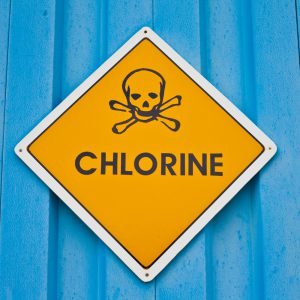Dangers of Overexposure to Chlorine

While Chlorine Does Have Its Benefits, It’s Still Dangerous
Chlorine is a chemical used to kill bacteria growth in water. It is used in drinking water, sewage sanitation, and in swimming pools. Additionally, it is also an active ingredient in a host of cleaning products. However, while chlorine is a helpful chemical when it comes to cleaning and sanitizing water, overexposure to chlorine can often lead to chlorine poisoning.
Often, for many pool owners, chlorine toxicity occurs because too much of the chemical was added to the pool or mixed with other chemicals, or the chlorination system has malfunctioned. Overexposure to chlorine can be very serious if not treated promptly.
What is Chlorine Poisoning?
While chlorine has been a helpful chemical when it comes to household cleaning supplies and purifying swimming pools, too much of it can lead to serious health complications. Chlorine poisoning can occur when you touch, swallow, or inhale too much of this substance. It can react with the water found on the surface of your skin and in certain areas in your body to produce hydrochloric and hypochlorous acid, both highly toxic.
Most cases of this poisoning occur when household cleaners containing chlorine are ingested, but it can still occur from pool water. Swallowing too much pool water can lead to chlorine poisoning. Additionally, if there is an excess of chlorine in the pool or has been mixed with other chemicals, it can lead to the production of chlorine gas that can be inhaled and lead to overexposure.
Symptoms of Chlorine Poisoning
Many individuals have experienced chlorine poisoning over the years, so it has become fairly easy to diagnose. In many cases, children tend to consume cleaning products containing chlorine. Children may also swallow too much pool water. They may struggle to express how they are feeling, so it is important to recognize these symptoms:
- Coughing
- Trouble breathing
- Fluid in the lungs
- Burning in the mouth or throat
- Stomach pain
- Vomiting
- Bloody stool
- Changing in blood pressure
- Blurry Vision
- Red and irritated eyes
- Skin damage
The severity of the symptoms may vary based on the amount of chlorine they were exposed to, the type of exposure, and the length of it as well. The diagnosis of the exposure is easy and should be able to occur shortly after ingestion.
Treatment
Treating overexposure to chlorine depends on the way that you have ingested the chemical. If you have inhaled it, leave that area immediately and go outside to breathe fresh air.
If you physically come into contact with chlorine, thoroughly wash that area of your skin with soap and water.
If your eyes become exposed to chlorine, rinse them thoroughly with water for roughly 15 minutes. For those that wear contacts, remove them before rinsing.
Do not attempt to drink any fluids or attempt to induce vomiting if you have swallowed chlorine or chlorine water unless instructed to by a doctor.
If symptoms are severe, go to the emergency room as soon as possible.
A good rule of thumb for all swimmers in a swimming pool, especially children, is to always keep your mouth closed while in a pool. This can keep water from potentially being swallowed. Also, for those tasked with maintaining the pool’s chemistry, always make sure you are properly keeping up with the pH levels and chlorine levels in your pool. You do not want to put your swimmers at risk of overexposure to chlorine.
Chlorine has plenty of benefits when it comes to cleaning inside the house and protecting your pool and swimmers from unwanted bacteria. However, it can still be fairly dangerous if not properly managed. Overexposure to chlorine can often lead to chlorine poisoning. The team at Mid City Custom Pools is here to help you better understand the importance of maintaining your pool’s chemistry for the safety of yourself and others.
